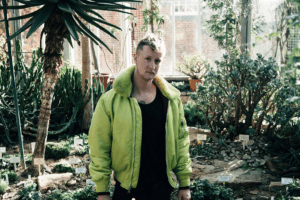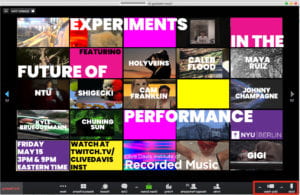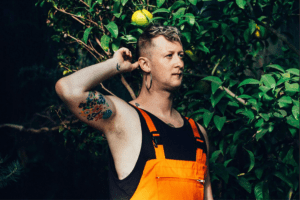 NYU Berlin Lecturer Colin Self was on a ten-day trip in Mexico when the COVID-19 crisis broke. His ten-day trip has become a multi-month journey, though the composer and choreographer continues to teach his NYU Berlin course, Experiments in the Future of Performing and Producing, from Mexico City.
NYU Berlin Lecturer Colin Self was on a ten-day trip in Mexico when the COVID-19 crisis broke. His ten-day trip has become a multi-month journey, though the composer and choreographer continues to teach his NYU Berlin course, Experiments in the Future of Performing and Producing, from Mexico City.
Self, who teaches in the Clive Davis Institute program in Berlin, explores themes related to expanding consciousness, troubling binaries, and boundaries of perception and communication, and his teaching is focused on the “exchange of energies” in the classroom. His class has a virtual live performance coming up on May 15. Details are in the flyer below.
1 – What inspired you to teach at NYU Berlin? How have you found the experience?
I was really fortunate to have met Jason King, Associate Professor and the founding faculty member of The Clive Davis Institute of Recorded Music who developed the international study abroad program Clive Davis Institute x Berlin. After some initial conversations, he invited me to submit a performance syllabus. With some dialogue, Jason generously approved and I jumped right into teaching. It immediately felt like I was on the right path, in the right place. Performance is my life and getting to build and share ideas about what it is and what it can be is an ongoing practice. The experience has been incredibly inspiring, from the first class into the current class. One of the best things about teaching is the perpetual learning experience that occurs in all directions, with dialogue unfolding into new territory every term. Perceiving and experiencing the world of music and performance through the eyes of artists who are 20 and 21 years old folds back into my own learning of what the future of music and performance will be.
2 – Prior to the COVID-19 crisis did you have any experience with remote learning / teaching?
No, this is all fairly new to me.
3 – How have you found the transition? How do the classes work?
 It was certainly a challenge at first try to think about performance as something that we could be in dialogue about over distance. So much of the class is about this kind of vis-à-vis energetic exchange between all of us in the laboratory of watching and responding to performance. As a perfmonance-maker that is really something that I cherish about performance pedagogy. The IRL [in real life] experience. It has required a great amount of re-imagining with a lot of care being put into presenting alternatives; asking questions about how the psychological and emotional conditions of this experience also affects art-making and performance.
It was certainly a challenge at first try to think about performance as something that we could be in dialogue about over distance. So much of the class is about this kind of vis-à-vis energetic exchange between all of us in the laboratory of watching and responding to performance. As a perfmonance-maker that is really something that I cherish about performance pedagogy. The IRL [in real life] experience. It has required a great amount of re-imagining with a lot of care being put into presenting alternatives; asking questions about how the psychological and emotional conditions of this experience also affects art-making and performance.
It took a couple of weeks to get into the flow of things, but actually turned out to be a wonderful bonding experience for the group. So often this class is about connectivity and creating mutually supportive relationships students have with each other and each other’s art-making.
4 – I noticed that you developed a new syllabus for a Zoom course and specifically pivoted to “explore the canon of experimental art made during pandemics, global crises, and how individual and collective limitations can activate opportunities to experiment and grow as artists.” Can you comment about that? Can and will great art come of this?
One of the most fruitful things that happened as COVID was unfolding was engaging with others about what it might mean to make art in this time. It started with a letter by California College of the Arts Dean of Fine Arts Allison Smith about art being made during crises and the role artists have to heal and process our collective experiences. I was then in conversation with Jason King about the AIDS crisis and trench art and the really deep emotional history we have on this planet of artists making work under challenging circumstances. Quite often history shows us that some of the most grave circumstances brought forth some of the most inspiring and evolutionary art-making. Now that we are seeing the amplification of care as a priority, and the distribution of resources to people who do not have as much, the creative landscape is changing.
5 – Have you or the students learned anything – whether academically or personally – that you might not have done in a classroom?
 One of the biggest lessons for me and so many others I’ve been in communication with has been the vitality of live performance and public assembly, and what a source of inspiration and energy that is to us both individually and collectively. Performance has always been a real life process of dreaming a better, different world into reality. Without that energetic interaction, I’ve realized what a treasure those experiences are and how there is really no replacing that over digital experiences.
One of the biggest lessons for me and so many others I’ve been in communication with has been the vitality of live performance and public assembly, and what a source of inspiration and energy that is to us both individually and collectively. Performance has always been a real life process of dreaming a better, different world into reality. Without that energetic interaction, I’ve realized what a treasure those experiences are and how there is really no replacing that over digital experiences.
6 – Anything else you would like to share?
I could say how deeply grateful I am for the interdependence and care that has appeared among colleagues both at NYU and other schools, to be in conversation with the present day circumstances, working together to re-imagine both our pedagogy and how to move forward together in a way that acknowledges and incorporates our collective condition. The problem-solving together, especially in regards to something like performance, continues to be one of the most inspiring experiences I’ve had at NYU – seeing across distance and difference, everyone working together to nurture our shared process of teaching.